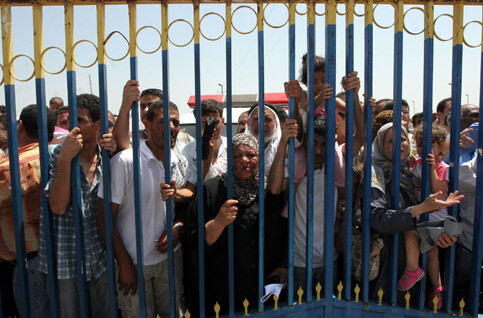The Electronic Intifada 7 August 2008

Palestinians wait to cross to Egypt at the Rafah border crossing in the southern Gaza Strip, July 2008. (Wissam Nassar/MaanImages)
Imagine if Chinese-Americans visiting relatives were prevented by the Chinese government from returning to America. Or if an American traveled to Iran and was then forbidden from reaching an airport to come home.
This happened to me at the hands of Israel, supposedly America’s closest ally in the Middle East.
I am a US citizen and small-business owner in Olathe, Kansas. I am also a Palestinian born in Gaza. I traveled to Gaza last December to care for my ill father. Israel trapped me there for four months.
Israel controls who and what goes in and out of Gaza. In the past year, it has imposed a near-total siege on Gaza. The 1.5 million Palestinians who live there are held in what many have referred to as the world’s largest open-air prison.
More than 600 Palestinian students in Gaza currently have grants to study abroad. Yet Israel forbids them to leave Gaza. Caught up in the policy were seven Fulbright recipients. The US State Department nearly canceled their scholarships because Israel would not let them travel.
After The New York Times publicized their plight, the decision was reversed, and four of the seven have now been allowed to leave. Yet hundreds of students still remain trapped, with the opportunities of their lifetimes — university educations — cruelly denied them.
Amnesty International documented in its annual report for 2007 that approximately “40 Palestinians died after being refused passage out of Gaza for urgent medical treatment not available in local hospitals.”
Goods produced in Gaza cannot leave to reach their markets in the West Bank or Egypt and critical supplies cannot be brought into Gaza. This has devastated Gaza’s economy and led to a humanitarian catastrophe.
More than 100,000 Palestinians in Gaza have lost their jobs and most of our 3,900 factories have been forced to close. Eighty percent are dependent on humanitarian aid.
Fuel shortages have meant that Gaza’s only power plant cannot provide enough electricity for people to refrigerate their food or operate their hospitals. And many people have begun running their automobiles on cooking oil.
I worry about the harm this does to the environment and to the young children who must breathe the noxious air.
We are unable to treat our wastewater, which runs into the Mediterranean Sea. Our children, escaping Gaza’s heat, then swallow the refuse when swimming.
The siege, intended to push us away from Hamas, has instead pushed Gaza into economic misery and resentment. It punishes innocent Palestinians, many of whom do not support Hamas to begin with and none of whom can control the actions of those few who lob crude rockets at Israel.
Yaser Wishah is co-owner of Xpress Fuel & Lube in Olathe, Kansas. This essay originally appeared in The Kansas City Star and is republished with the author’s permission.


